And So It Goes is getting back to its roots with today’s guest post. And I for one am thrilled.
Richard C. Burke is a professor of English at Lynchburg College in Lynchburg, Virginia, where he has taught since 1985. He has traveled widely, beginning with a junior year spent in England in 1972-73, but never more so than in 2017, when he saw Vietnam, Cambodia, Norway, Denmark, Iceland, China, the UAE, Russia, and Kazakhstan.
In his last trip, he spent the fall of 2017 in Ust-Kamenogorsk, Kazakhstan as a Fulbright Scholar, teaching literature at the Kazakh-American Free University. He also lectured in Shymkent and in Novosibirsk, Russia.
Dr. Burke and I exchanged a few emails before he left and when I suggested he guest post upon his return, he agreed. Yay, me!
What I like most about the post he submitted, is that it focuses on that early stage of travel, what I called — and have since learned many call — the honeymoon phase. Peace Corps volunteers generally experience this for the first two or three months in country. Check out the end of Chapter Five in my memoir, where I describe the end of my honeymoon phase.
Take it away, Richard.
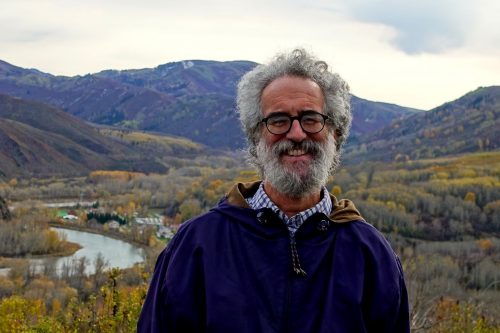
Travel takes us to the new and unfamiliar. And we have to deal with a place that we have imperfectly anticipated. This encounter with the unaccustomed can be anything from a revelation to a collision. On my first venture overseas, excitement at being in London was tempered with the quickly arriving realization that England was not, in fact, the enchanted kingdom of my adolescent imaginings. My first impression was a mixed one.
But there are occasions when we come to a new place and find ourselves filled with delight. This feeling isn’t something we choose. It happens to us, and it’s something more than just pleasure or satisfaction. We find a resonant charm in our surroundings, an easy welcome, a sense of rightness and that this is the best we hoped for from our trip. Wandering or sitting, we draw joy from the cityscape, the natural beauties, the sounds of foreign voices, the friendliness of people in shops, the quality of the food, the abundance of flowers or churches or bookstores or public toilets. We’re not just fine. We’re pleased beyond words.
A single feature—St. Basil’s Cathedral in Red Square, say, or the uncanny flow of traffic in Saigon—can’t create this delight. Our joy emerges from the beauty and appeal of many parts of the whole. And it’s like a sunny moment in London: neither its arrival nor its withdrawal can be anticipated or controlled.
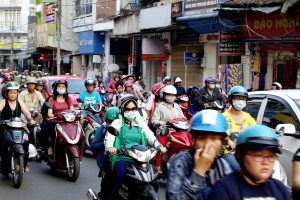
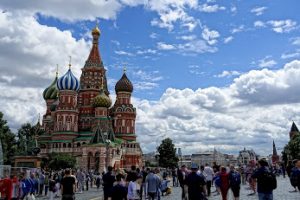
A friend describes this experience as the traveler’s honeymoon. I’ve experienced it in Prague and Barcelona, among other places. Both cities have architectural splendors that surprise and enchant, that can somehow leave visitors simultaneously slack-jawed and beaming with happiness. And then there’s the food and the art and much, much more. (Even the prices can contribute to this effect.)
Most travelers’ honeymoons fade to a calmer pleasure (or less) within a few hours or days as the high spirits engendered by the early going give way to a more balanced range of emotions. Only rarely will that sense of the marvelous endure for the whole length of a trip.
Last fall, I spent four months in Kazakhstan, and the traveler’s honeymoon never ended for me. I arrived at the start of September, full of uncertainty and with a very imperfect notion of what to expect. But beginning with the first morning and the friendly guys who helped me buy a local sim card, I was delighted. Over time, that effect was sustained by the great people I met and taught and worked with, and by completely ordinary things: the daily walk to work and back, the frequent trips on the rattling buses, the familiar vendors at the outdoor markets, the taste of shashlik, even the over-hot radiators in my apartment that required me to keep vent windows open even as the outside temperature fell below zero. These never lost their appeal for me.
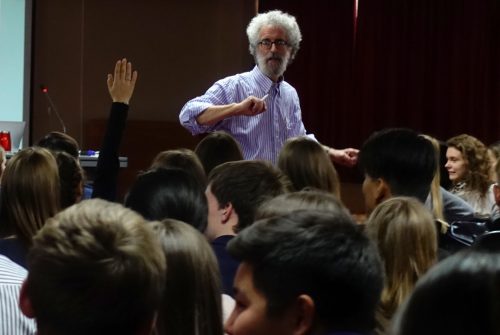
I lived in Ust-Kamenogorsk, in the far east of the country, a Fulbright Scholar teaching literature at Kazakh-American Free University, and my traveler’s honeymoon lasted until I boarded a plane for home. It still goes on, in fact.
It’s not that I thought Kazakhstan was magical in some way, or that Ust was a fairy-tale village (it’s a city of some 300,000 where metallurgical industries predominate). But for four months, I retained a deep delight in being there, living amidst friendly people, successfully navigating the public transportation system, seeing sights both marvelous and mundane, enjoying my students and colleagues, and on and on.
Life there wasn’t flawless. Getting the bank to exchange the 10,000 tenge notes I got from their ATM for something more negotiable was regularly an awkward challenge. I disliked the way rain pooled up at intersections, making the walk to work a messy business. But for the most part, I experienced Ust and Kazakhstan through a glow of elation.
How does the traveler’s honeymoon happen? Wherever we might experience it, the local people certainly aren’t living in a state of uninterrupted bliss. So what are we seeing and what are we missing when we’re caught up in this cheerful sense of the place?
First of all, we’re romanticizing the place based on expectations that we’ve brought with us and the best of its most visible features. We try new things, meet new people, compare what we’re seeing and doing with the oh-so-familiar routines of home, and we find that we feel good. Why this happens sometimes and not others, even when we truly enjoy a trip, is a mystery of the emotions.
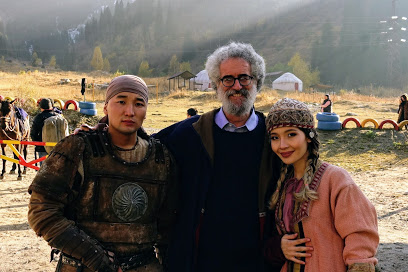
Unless we are corporate or military marauders, we normally travel with a degree of innocence, a relative freedom from disagreeable knowledge. Where we can, we tend to ignore disagreeable realities: oppressive governments, worrisome economic problems, and, above all else, the day-to-day irritations and frustrations that exist everywhere.
Our enjoyment of a place is not contingent upon everything that influences the quality of life there (if it were, what city would be immune to our concerns and criticisms?). We have to be able to deplore the poverty and corruption that beset Cambodia and nonetheless stand awestruck in the midst of the Angkor temples. If we can’t, there will be no traveler’s honeymoon for us.
We travel for experiences, and we first process these at an intuitive rather than an intellectual level. Gazing at the domes of St. Basil’s or wading through a flood of traffic in Saigon—or riding a tram in Ust-Kamenogorsk—our spirits may rise beyond anything we can explain. Confusion, anxiety, and fatigue are commonplace for travelers, even on good trips. But not inevitable. Sometimes, if our experiences are mostly positive—if we encounter cheerful bus conductors rather than high-handed customs agents, if we find we actually like shubat (fermented camel’s milk), if Stalin-era apartments turn out to be handsome and comfortable—we may find ourselves enjoying the traveler’s honeymoon.
During my time in Kazakhstan, I learned a great deal about the country, its past, its culture, and its people. I had plenty of time to grow disenchanted. But somehow I didn’t. The country I experienced day by day remained (and remains) a joy right to the end. The long-enduring traveler’s honeymoon: it’s greatly to be desired.
But, oh! it makes leaving difficult.
###
Thank you so much for joining us today, Richard, and giving us an intro to your semester in Kazakhstan. You’ve started us off well, recalling your honeymoon phase in country. It’s such an important part of any world travel and often misunderstood.
I’m eager to see what questions my readers will pose to you and know you’ll be popping-in in-between classes to field them while I’ll be grandmothering in Ohio. Again, my thanks.
You can read more of Dr. Burke’s biography on his Lynchburg College faculty webpage.
How about you? Have you experienced this phenomenon that Dr. Burke describes?
NEXT WEEK: To Vote or Not to Vote, That is the Question.
Susan Jackson
Did when I went to Switzerland. We stayed in Lake Lucerne and traveled around but I couldn’t get over the “air”. I just wanted to take great gulps of it as it was so clean and fresh. I envied the people born there. Young children and elders would ride bikes up hills I was out of breath walking up. I didn’t go to the huge towns but stayed in smaller and countryside, maybe that was the difference, and everthing was so clean.
Richard Burke
Nice! I wonder how often this feeling of exhilaration comes from something seemingly minor that we can’t anticipate, like the air or the quality of light or even the friendliness of staff in the restaurants we eat in. The architecture of Paris isn’t likely to take us by surprise in the way that the air in your town took you.
Janet Givens
Hi Susan,
I know Lake Lucerne too. Back in my Stuttgart days (Poppenweiler to be more precise; I believe we’ve talked about that before). I hear such exhilaration in your voice. What a great memory.
Joan Z. Rough
If it wasn’t “Traveler’s Honeymoon,” it could very well be that your energetic self found a place where it was welcome and comfortable. I remember my first trip to Ireland. As the plane touched down I felt I was home. There was some invisible something that never left me whenever I was there.
Everyone should be required to travel beyond our own borders. It opens up the world for us and we find borders mean little. It’s the people that bring us to understand ourselves and our world in a much broader sense.
Joan Z. Rough recently posted…Watch! They Can Do It!
Janet Givens
Indeed it does, Joan. Well put.
Richard Burke
Yes, there do seem to be countries where we feel almost unaccountably comfortable. That’s been my experience with Russia, even though I have occasionally found myself getting a bit of hostility from someone who really can’t be bothered with a foreigner who doesn’t speak Russian. I have always found myself missing Russia when I’ve left there. Kazakhstan had some of the same appeal for me; but since I was there for much longer and met so many people, it was even better.
Laurie Buchanan
Richard — It’s a pleasure to meet you here at AND SO IT GOES. I thoroughly enjoyed reading your guest post. Especially your definition of delight and its distinction from pleasure or satisfaction. In my experience, it’s our awareness of the details that add rich texture to our life experience.
Laurie Buchanan recently posted…Get Back on the Bus
Janet Givens
What’s that saying, Laurie, “The devil is in the details.” ?? I like your take on that one better — that they add a rich texture to our life experience. Thanks for joining us today.
Richard
Thanks, Laurie. One real benefit (among many) of being a Fulbright Scholar is that you have the time and the attention from local to become aware of all manner of details, large and small, that you might miss on a more ordinary visit. As unlikely as it may sound, I got a surprising amount of pleasure from simply riding the buses in Ust-Kamenogorsk. And those experiences were enriched by the range of people I saw and the different bus conductors who came around to take my money and the slightly battered buses that had first seen service in some distant European country. All these things kept adding up, and in a small way, they kept changing and enlivening my sense of the city.
Janet Givens
First, let me add my welcome to the others here on And So It Goes. And thank you Richard for holding down the fort here yesterday when, as you know, I was waylaid in the court of Queen Elizabeth the first (NOTE TO READERS: see my Facebook profile for more information). I had a blast, if that can be the word.
“This encounter with the unaccustomed can be anything from a revelation to a collision.” Richard, this sentence popped out at me as I reread your post this morning. You talked about the influence of expectations on one’s experiences, but I’m wondering how one’s fundamental personality might influence their experience of these dramatic cultural differences. There’s the basic optimist-pessimist dichotomy, of course. I guess I’m curious about what it might be that enables a visitor to a foreign land to stay curious, engaged, and enchanted. We’ve all read too much of the “ugly American” sagas. Any advice for my readers on how each of us can maintain that sense of openness that you enjoy?
Richard Burke
Oh, Janet, what a great issue you’ve raised here! Certainly, the “ugly Americans” aren’t open to differentness, right? They complain that “it’s not like this at home” and wonder why people in this country can’t just pay for things with dollars. (I don’t imagine that there are many of these people reading your blog regularly.)
Surely an eagerness to experience what is new and different is important to travelers. When we aren’t feeling that openness, we might ask ourselves why not–and what might we do about it.
Someone at the U.S. embassy in Astana advised me to “Say yes to everything” when I first got to Kazakhstan. It was great advice. And if we want to keep the excitement strong, we might need to occasionally remind ourselves that the differences are why we came to this foreign place.
And yet: in my own traveling, I find that some degree of comfort and familiarity is needed if I’m going to be able to enjoy all that is different. A reasonably good hotel and a western breakfast go a long way to meeting that need for me.
I’m not sure that I’ve offered any useful advice there. If I think of something that qualifies, I’ll add it in.
Janet Givens
Thanks for your thoughtful reply here, Richard. And especially your thought on “differences are why we’ve come.” Indeed. I’m thinking the ugly american to me, now, is the one who when he feels frustrated in the new culture, he blames the new culture, blames the other. How much easier it is to point that finger! Rather than figuring out what it might take to ease the pain.
Familiar breakfasts seem to be a universal accomodation. I’m glad you mentioned that. I’ve been in hotels around the world where I couldn’t get a local breakfast in the morning because the buffet table was filled with “typical breakfasts” from around the world, for benefit of their international clientele: Pickled veggies for the Japanese, chocolate for the Dutch, sugar for the French and bacon and eggs for the Americans. You get the idea. What I used was that bubble bath AND I used American movies once a week as my community project and I realized soon enough that watching these offered me that little “fix” of the familiar that helped tremendously. I think knowing how to listen to our bodies — for they tell us what we need — is key.
Janet Givens recently posted…To Vote or Not to Vote, That Is the Question
Tim Fearnside
Thank you, Richard. I most enjoyed your attempt (successful, I might add!) to put into words something so elusive, this “mystery of the emotions,” yet one that I have also experienced a few times in my life. Coincidentally, one of those was also in Barcelona, in the early ’90’s. Cheers!
Tim Fearnside recently posted…One Big Lie
Richard Burke
Thanks, Tim. Yes, Barcelona strikes me as a city where this experience is more likely than in most others. But I’d be curious to know where anyone else may have enjoyed the traveler’s honeymoon.
Tim Fearnside
I would be curious, too. As for me, I haven’t traveled extensively, particularly internationally, and am struggling to recall where else I’ve experienced this feeling, although I know that I have on other occasions, at least to a degree. Domestically, New Orleans may be the closest, although perhaps it’s another fairly obvious choice . . .
Tim Fearnside recently posted…One Big Lie
Janet Givens
Thanks for joining us Tim. Barcelona, huh? I feel a story there. 🙂 I hope I’ll read of it on your own blog sometime.
Janet Givens recently posted…To Vote or Not to Vote, That Is the Question
Tim Fearnside
Yes, there probably are a few stories buried in that trip. Perhaps a blog resides among them 🙂
Tim Fearnside recently posted…One Big Lie
R. Lutz
I remember my keen pleasure peering out a jimmy rigged plastic wrap around used for a tent on the Kerry peninsula in Ireland. Everything was green and the sea was silver and there was a cow staring at us and trying to figure out who or what we were. I was with a guy called. E. James Burke 3
Janet Givens
Welcome, Richard. The image you convey sounds delightful. Thanks for sharing.
Kate Pill
Wonderful thoughts and musings – thank you 🙂
Janet Givens
Hello Kate. Thanks for stopping by. Glad you enjoyed the excursion through Ust.
Janet Givens recently posted…To Vote or Not to Vote, That Is the Question